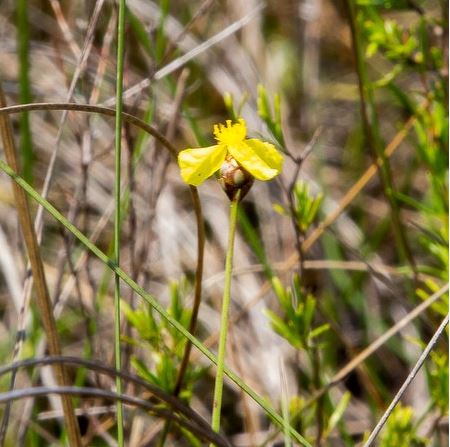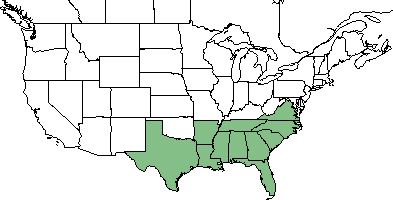Difference between revisions of "Xyris ambigua"
| Line 1: | Line 1: | ||
{{italic title}} | {{italic title}} | ||
| + | Common names: coastal plain yelloweyed grass | ||
<!-- Get the taxonomy information from the NRCS Plants database --> | <!-- Get the taxonomy information from the NRCS Plants database --> | ||
{{taxobox | {{taxobox | ||
Revision as of 19:09, 15 June 2018
Common names: coastal plain yelloweyed grass
| Xyris ambigua | |
|---|---|

| |
| Photo by John Bradford hosted at Bluemelon.com/poaceae | |
| Scientific classification | |
| Kingdom: | Plantae |
| Division: | Magnoliophyta - Flowering plants |
| Class: | Liliopsida - Moncots |
| Order: | Commelinales |
| Family: | Xyridaceae |
| Genus: | Xyris |
| Species: | X. ambigua |
| Binomial name | |
| Xyris ambigua Kunth | |

| |
| Natural range of Xyris ambigua from USDA NRCS Plants Database. | |
Contents
Taxonomic Notes
Synonyms: none
Varieties: none
Description
Also known as coastal plain yelloweyed grass, X. ambigua is a native perennial forb that is a member of the Xyridaceae family. [1] The leaves are broadly linear, 15-40 cm long, curvate of slightly twisted, and tips either blunt or acute. Bracts ranging reddish-brown to pale brown, while lateral sepals tan to reddish with a broad, ciliate keel. [2]
Distribution
It is native to the southeast United States, ranging from eastern Texas to Virginia, mostly occupying areas along the coastline. [1]
Ecology
Habitat
X. ambigua can be found in communities that are not human disturbed, ranging from wet savannahs and flatwoods to pinelands and edges of depression ponds. [3] As well, other communities include moist sands or sandy-peats of bog margins, and lakeshores. [2]
Phenology
Common flowering time ranges from June to September as well as the month of November. [4]
Conservation and Management
This species is listed as endangered in the state of Tennessee. [1]
Cultivation and restoration
Photo Gallery
References and notes
- ↑ 1.0 1.1 1.2 USDA Plants Database URL: https://plants.usda.gov/core/profile?symbol=XYAM
- ↑ 2.0 2.1 Kral, R. (1960). "The genus Xyris in Florida." Rhodora 62(743): 295-319.
- ↑ Weakley, A. S. (2015). Flora of the Southern and Mid-Atlantic States. Chapel Hill, NC, University of North Carolina Herbarium.
- ↑ PanFlora URL: http://www.gilnelson.com/PanFlora/